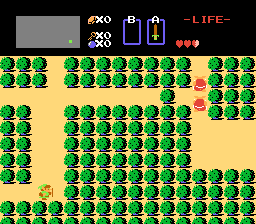First trailer uploaded!
/I've uploaded a trailer showcasing the first area of the game.
I've uploaded a trailer showcasing the first area of the game.
There is definitely a pressure on indie developers to create works of avante-garde, artistic, or experimental aspirations, but when I'm being most honest with myself about what I actually find enjoyable, it's old-school classic gaming, hence Axiom Verge's decidedly 8-bit vibe. So, to explain myself a bit, I thought I'd make a blog entry or two about classic games and why I'm so drawn to them. It turns out there's quite a lot there, so I'm going to narrow the focus of this particular entry to one topic:

Can you guess which tree has a secret passage under it?One thing that I keep coming back to was the compelling aspect of mystery to those old console games, partially derived from the relatively cryptic nature of the hardware itself the limitations it placed on designers. In the case of Metroid and Zelda in particular, there was the feeling that every room could hold a secret - tiles that could be destroyed or walked right through looked the same as other tiles, and it wasn't obvious where you were "supposed to" go - if there was a "supposed to" at all.
In modern games, by comparison, overt golden glows and prominent crack textures are necessary to distinguish hidden items and secret passgeways from the non-interactive background props that comprise the majority of what you see, with the result that you're perpetually reminded that the game world is a constructed thing. Now, I'm not saying that there should be no guidance at all, or that a game should be impossible to play without a hint book (does anyone else remember turning to Nintendo Power to find out what "hit deborah cliff with your head to make a hole" meant in Simon's Quest?), but I'm convinced that there must be some happy medium wherein the game, by virtue of its intrinsic design properties, can direct players unobtrusively, and rest assured that they are capable of figuring out the rest on their own.

Another thing adding to the overal impression of enigma to classic games is the fact that classic game designers really weren't afraid to delve into the surreal on a regular basis. Over time re-exposure to them has dulled the effect they had, but when you think about it, some games had truly weird elements that, whether intentional or not, created an impression that an unbelievable, exotic world lied beyond their playable bounds. Take the "indoras" of Rygar, for example - the mystical guru-like old men hidden in rooms throughout the world, always sitting on an inaccessible ledge and usually spouting cryptic advice. What are they doing there? Are they the only sentient inhabitants of the Rygar universe? Their presence and purpose is never explained, unlike in modern games, where an encyclopedic description such characters and their origins would certainly be available in some form - if only in a revisionist remake - but, by their accessibility, deprive players of the profound sense of mystery that accompanies such unexplained oddities. Sometimes I think it's best if, even if elaborate histories exist in the developer's documents, they not be exposed to players directly; instead I'd rather see them poking through to the surface from time to time, hinting at something that's alien and ancient and other, but leave the rest up to my imagination.

Not your typical Metroid screenshot.And then there are the glitches. Super Mario Brothers' Minus World is probably the most famous, but Metroid's secret worlds were, in my opinion, one of the greatest wonders an eight year-old child could encounter. For the uninitiated, these were rooms you could enter by exploiting a bug allowing you to walk through walls and go places that the programmers hadn't explicitly programmed. In modern games, if you could manage such a thing, there is usually empty space in those places. Not so in Metroid. These forbidden cavities were like a distorted dream version of the rest of the game world - the impression this left was that the world wasn't designed so much as appropriated from something vast and unfathomable; the parts that you were meant to play balancing precariously on its edge, like a village arising on the slopes of a million year-old volcanic island, the inadvertant the product of processes more ancient and powerful than its inhabitants ever imagined.
his is the Axiom Verge site description. Hooray!
Copyright 2014 Thomas Happ Games LLC